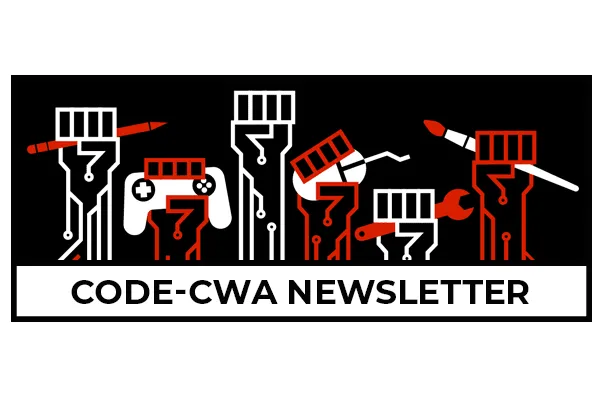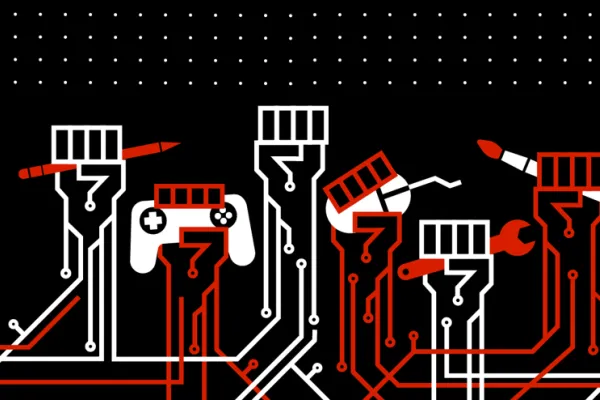CODE-CWA Newsletter July 10

We are in the midst of several crises that are intersecting and revealing greater and greater disparities and injustices. There is a lot to grieve, to be enraged by, to feel overwhelmed by, but, this is also an incredible moment of possibility. Never have the true solutions been so clear to the range of labor, economic, environmental, social and other issues we face. In this moment of severe crisis, we also face immense opportunity to shape what comes next.
Trying to organize a union in your company? Get in touch, and let’s build together.
Events
CODE-CWA is regularly hosting free, virtual training sessions on how to organize! Registration information can be found here.
Worker News
A Strike for Black Lives will bring together workers calling for an end to systemic racism: Major unions and civil rights groups have announced the Strike for Black Lives which will take place on July 20 in more than 25 cities. Workers, including tech workers with the group Googlers Against Racism, will walk out for 8 minutes and 46 seconds, the same amount of time that Derek Chauvin knelt on George Floyd’s neck. Workers in LA will gather to call on the nation’s second largest school district to remove police officers from their campuses. And workers across the country will be protesting the lack of workplace protections during the COVID-19 pandemic. The strike is being coordinated with the Movement for Black Lives, the Poor People’s Campaign, the Fight for $15, and United Farm Workers. We cannot have economic justice without racial justice.More onUSAToday.com
How Labor Laws Disfavor People of Color: Companies have put out statements in support of #BlackLivesMatter, yet their labor laws continue to punish people of color. The majority of workers in minimum wage or contractor positions are people of color. Historically this has come from exclusions of domestic and farmworkers from the Social Security Act and New Deal legislation. More on BrennanCenter.org
How the American Worker Got Fleeced:COVID-19 could give more employers power to hire workers indirectly and challenge labor rights, or it could mobilize workers to fight back and unionize. U.S. companies are using internal policies to crack down on workers that challenge their company’s COVID-19 safety policies and mobilize others to join them. The National Labor Relations Act (NLRA) has serious lack of protections for teenagers, incarcerated workers, tipped workers, disabled workers, domestic workers, farmworkers, supervisors, and independent contractors. Workers are being pushed into jobs where they are subcontracted with limited labor power. The Families First Coronavirus Response Act does not apply to a lot of essential workers denying them paid sick leave. OSHA announced that it would address COVID-19 complaints by asking employers to investigate their workplaces. These conditions have prompted a wave of strikes and protests that have spread quickly opening up the possibilities for changing labor law. More on bloomberg.com
The Real Cost of Amazon: Amazon’s fulfillment centers have had an unprecedented series of COVID-19 infections prompting public petitions, protests, and unrest. While COVID-19 safety measures are improving, a company with $1 trillion dollars in value continues to abuse its workers and suppress dissent. More on Vox.com
OSHA Complaint Tracker: Online tool available to workers that tracks complaints made to Occupational Safety and Health Administration (OSHA) during COVID-19. They’ve compiled an interactive map with the names of employers, narrative descriptions of their offenses, and an overall breakdown of complaints by industry.More on thestrikewave.com
Cards Against Humanities Workers are Unionizing: Employees at Cards Against Humanity are unionizing. Following the footsteps of workers at Glitch, Kickstarter, Gawker, and the Onion, a diverse coalition of workers at this board game company is challenging their toxic management. More onTheVerge.com
Organizer Tip of the Month
Stuck in a conflict? Identify a possible direct request and make it. All organizers are used to diagnosing the challenges hindering worker momentum. When organizing our workplaces it can be almost too easy to identify what’s not working, from the institutional to the interpersonal.
Naming problems is an asset in organizing, but it can stick us in a mode where we ruminate on the challenges and spiral, leaving us unable to recognize our own agency. That is why building a practice of making direct requests can help us habituate processing conflict while simultaneously identifying a potential shift that can move us forward.
Every crisis is an opportunity, and building a habit of making a direct request in response to conflict can help us grasp and shape these moments of opportunity.
This Month in Labor History
The Newsboys' strike of 1899 has become one of the most recognized strikes in pop culture due to Walt Disney Pictures’ Newsies. Before widespread child labor began to die out in the 1930s thanks to numerous anti child labor campaigns, millions of children were forced to work in order for their families to survive. One job that was often held by children was working as a “newsboy” or “newsie”.
In July 1899 Newsboys would have to purchase papers from New York City’s the Journal and the World while being stuck with any unsold papers. Business began to struggle after the Spanish-American War had ended and headlines became less enticing to customers. The newsboys felt this loss acutely and were angered by the papers’ predatory practices, including rising their wholesale prices the year before, during the wartime news boom.
After newsboys in Long Island City realized a deliveryman had been cheating them, they demanded a price rollback and refused to sell either the Journal or the World newspapers. Word spread throughout New York and on July 19 the children met to announce a union and general strike. Nearly 5,000 newsies came together for one meeting where one leader, Kid Blink, said, "Ain't that 10 cents worth as much to us as it is to Hearst and Pulitzer (newspaper owners) who are millionaires?" demanded Kid Blink. "Well, I guess it is. If they can't spare it, how can we? I'm trying to figure how 10 cents on 100 papers can mean more to a millionaire than it does to newsboys, an' I can't see it!"
After losing more than half of their business and mounting public pressure, the Journal and the World agreed to the newsies demands on August 2, 1899. While the circumstances of this particular strike are outrageous, the innate understanding shared by newsies of their collective power is shared by workers across the globe today. Read more here.
Brooklyn newsboy, ca. 1910 Photo by Lewis Hine (Library of Congress)
Song of the Week
Tracy Chapman, “Talkin' Bout a Revolution”
Don't you know
They're talkin' 'bout a revolution
It sounds like a whisper
Don't you know
They're talkin' about a revolution
It sounds like a whisper
While they're standing in the welfare lines
Crying at the doorsteps of those armies of salvation
Wasting time in the unemployment lines
Sitting around waiting for a promotion
Don't you know
They're talkin' 'bout a revolution
It sounds like a whisper
Poor people gonna rise up
And get their share
Poor people gonna rise up
And take what's theirs
CODE-CWA Newsletter: February 21, 2025

